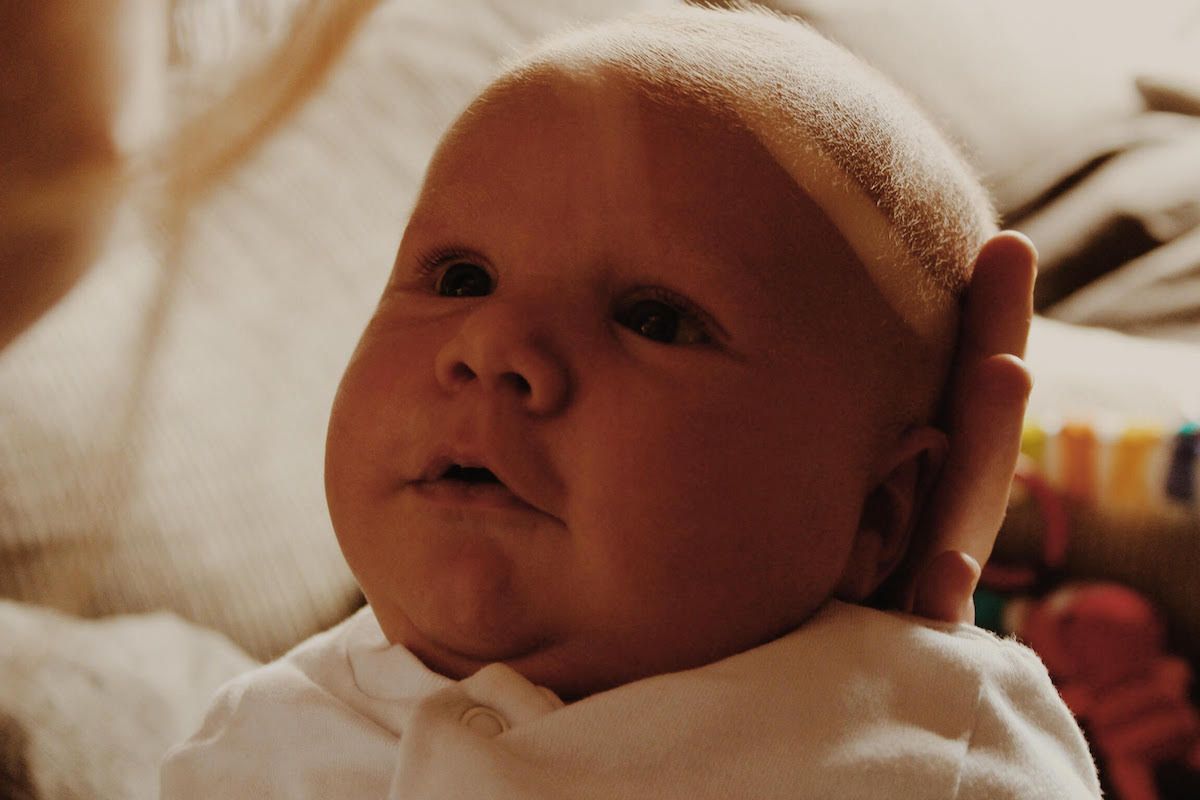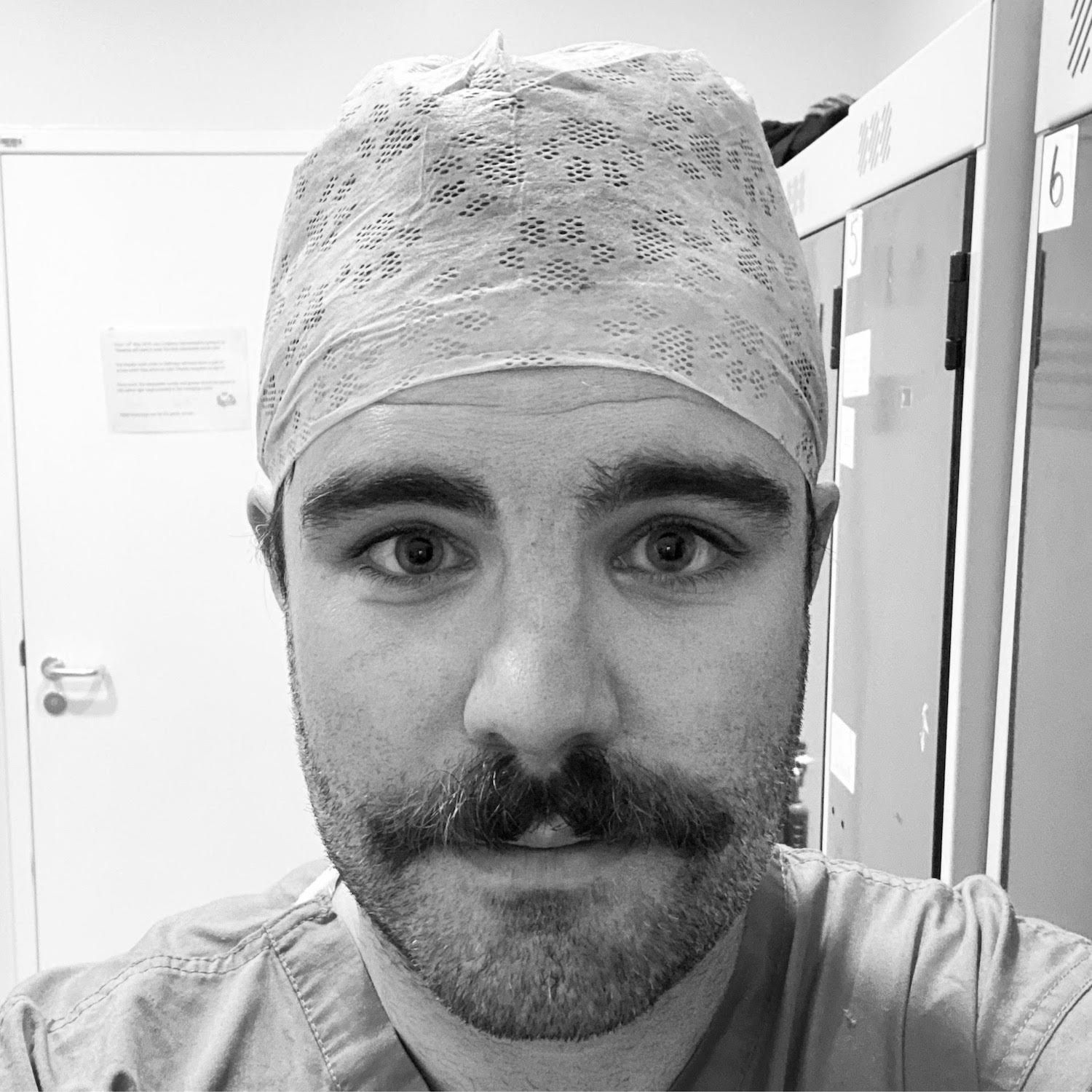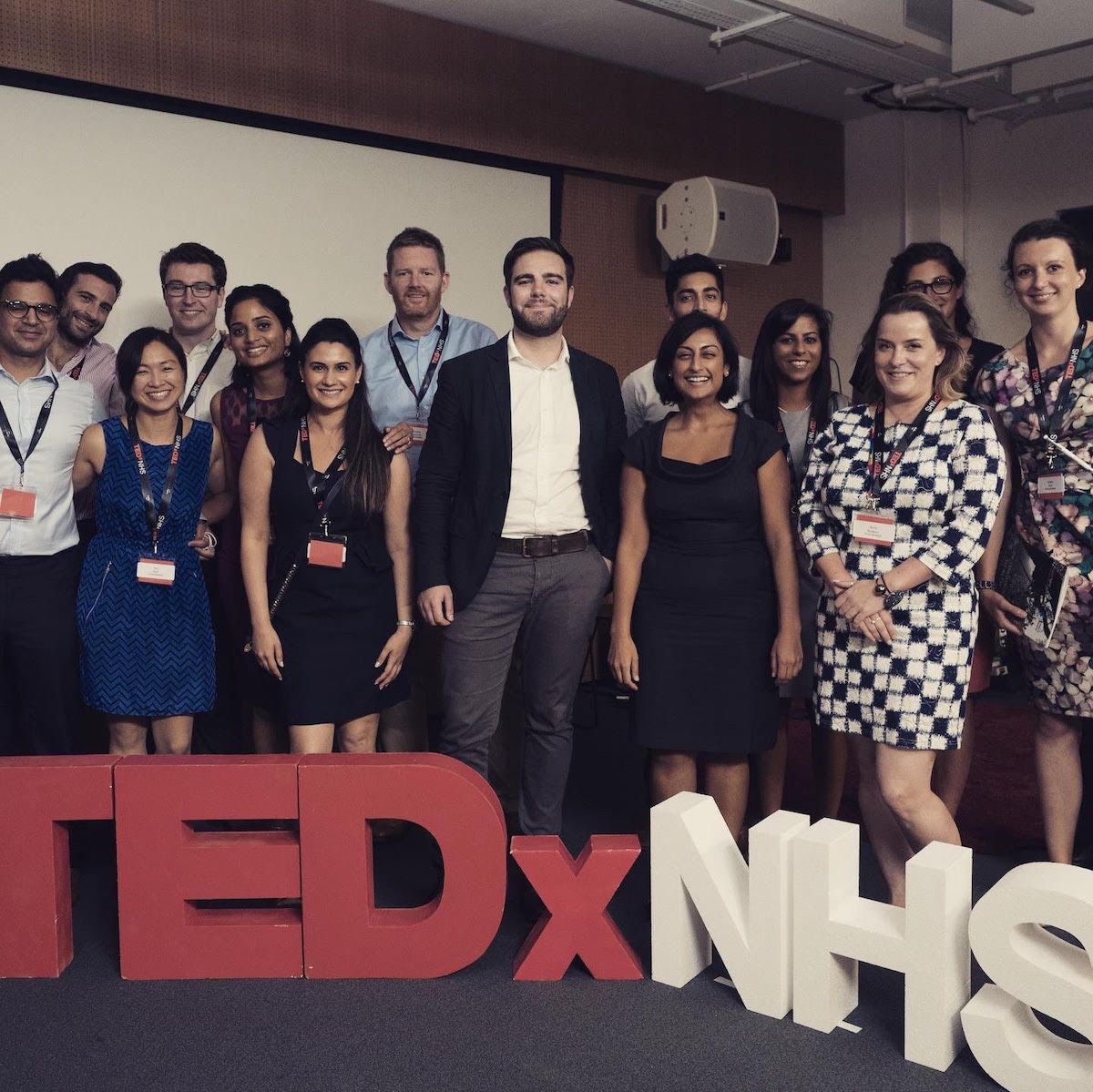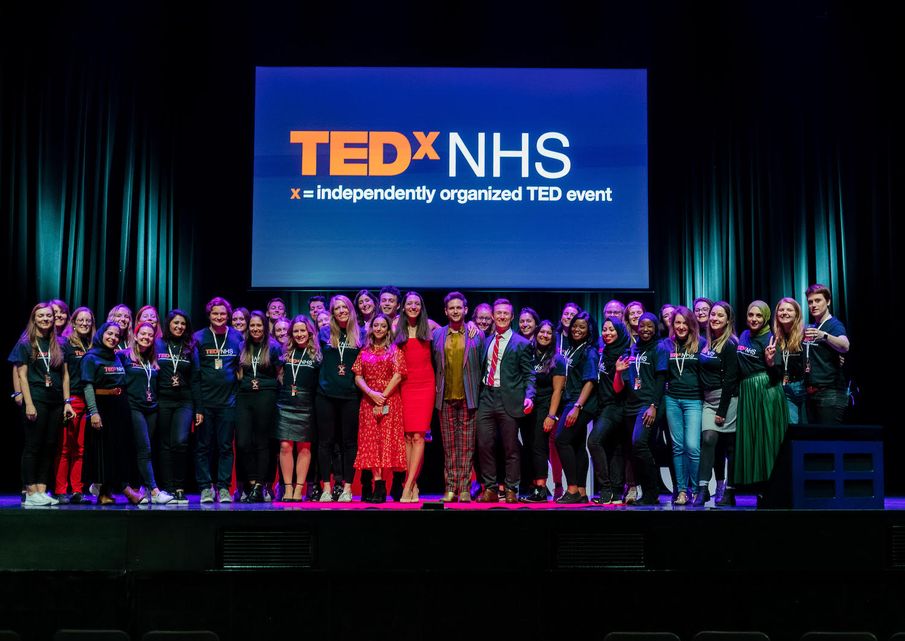Jon Holley is a trauma and orthopaedic surgeon and co-founder of TEDxNHS – a place for empowering talks for the NHS, by the NHS
*Trigger warning: Themes around a baby’s death.
My beautiful son Theo died seven years ago.
Five weeks into his short life, the magical delight and abundant possibility of the night he was born turned to heartbreak and deep despair as we sank into our chairs in disbelief at his doctor’s words: “He is going to die”.
We found out then that he had a terminal condition called Spinal Muscular Atrophy Type-1. Our world was ripped apart. Everything changed.
We took Theo home. For the next four months, knowing that every day could be his last, we set about making his life as good as we could with incredible support from our palliative care team, family and friends.
We watched him grow and watched him get weaker. He smiled, expressing most things with his face, which was the only bit of his body he could move to any great degree. We poured our love over him and, for that time, he was our only focus. His life was full of love.
Just like the night he was born, the night he died was a deeply profound and spiritual moment. The atmosphere was thick and heavy as we held his little body in our arms and felt him struggle in the tension between life and death. As he fought, we sang to him passing him to each other in our bed. When he died, it was as if everything stopped. I expected the sky to rip and fall.
We’d started grieving when we knew of Theo’s diagnosis but the process of letting go brought wave upon wave of sadness upon us. Each step in the process seemed to make it hurt more – from giving his body a bath, to taking him to the cold room at the hospice, to putting him in the casket and then in the ground in a churchyard near my wife Hannah’s parents’ house.
We chose to do every bit of it ourselves, with our own hands. We slowly tumbled into an abyss of grief.

I lost my faith. I lost friends. I stopped speaking to some of my family. I changed fundamentally. I lost resilience in the face of stress. I was constantly tired and couldn’t get up in the morning. The joy I had in life was gone. In short, I was grieving, but I’d also become depressed.
Back at work, I found a new compassion for people that I hadn’t had before. I finally understood the power of empathy and started using it. My patients appreciated it and told me. In some cases, they finally had a doctor who really listened to how they were feeling and what mattered to them.
In other ways, being a surgeon became more difficult. I found it excruciating when I had to treat kids of Theo’s age. For the first time in seven years as a doctor, I escaped to the bathroom during a shift and cried.
In 2015, I had the chance to escape frontline medicine for a year and pursue a fellowship in the health policy world. I became one of Professor Sir Bruce Keogh’s fellows when he was National Medical Director for NHS England. This space allowed me to recalibrate to my new reality and gave me a different perspective on the atmosphere of the NHS frontline.
Surgeons are tough… But what happens when something major happens in your life and you find yourself changing and evolving into someone different?
This experience highlighted how much we needed to change on the wards and in theatres where I worked. The job we do is a privilege but it’s also difficult. It demands so much from us and many of us feel drained, demoralised and burnt out. Where was the voice of optimism in healthcare? Where was the permission to say ‘It’s OK not to be OK’? Where was the creativity and aspiration, the dream of what we could do, the energy?
I wanted to hear a different story told.
Manpreet Bains, another leadership fellow, and I set out to find the hidden gems – the ordinary (but also extraordinary) people who would tell us their story. To help us really listen. To start conversations, spark curiosity, challenge assumptions and, ultimately, inspire us to keep going. Something kind. Something real and gritty, but also full of hope.
That’s why we chose to set up TEDxNHS with the help of Sir Bruce. The TED model runs on storytelling. Stories connect us. They’re emotive and real. A good story can change things. Maybe one day I could tell mine?
As a surgeon, there is a risk of harming people if things go wrong. So it’s easy to see how surgeons can struggle with their mental health. We hold the fears of our patients alongside our own anxieties as we perform our role. The spectre of litigation is never far away. Our job is taxing on the mind.
Surgeons are tough. In some ways, we self-select based on our ability to cope with stress and the ability to perform under pressure. But what happens when something major happens in your life and you find yourself changing and evolving into someone different?
Can surgeons cope when they get depressed? It’s something I’ve been hyper-aware of after starting to take medication for depression. Should I really be here? Now that I was somewhat ‘broken’, I wondered how I could continue to care for others.

Six years later, now that I’ve finally shed some of the stigma of mental illness that I’d put upon myself, I can clearly see that none of us have it all together. The illusion of a surgeon needing to be perfect in every way is easily dispelled by a quick look around the departments where I work.
Some surgeons are a bit dishevelled. Some junior doctors are always just a little late or have dips in verbal fluency. Some fly off the handle on the phone to colleagues at minor things. Since being open about my struggles, more colleagues talk to me about how they are feeling. I can tell you that surgeons are definitely not immune to mental ill-health.
Studies show that surgeons in the UK are less likely to use support services for mental illness. Some have said that this is due to a ‘survival of the fittest’ phenomenon where only those who have the resilience and mental toughness remain. I don’t buy that.
Despite our aspirations, we’re not superhuman. Even if we’re more robust than other people, there’s still the chance, like I’ve experienced, where a major life event can weaken our resilience and lead to mental health problems.
It took me too long to admit to myself that I was depressed and too long to get the help I needed. By speaking out, I hope that others who are feeling like I did will be able to ask for help if they need it. I found great relief in just hearing my GP say, “I think you’re depressed” and in starting medication.
Therapy has also helped massively. I see it as an investment in myself so that I can continue to help others. My advice for anyone who is struggling in isolation and silence is to listen to those around you, take a good hard look at yourself and act on the results. It might mean booking a GP appointment or talking with a friend or family member. Or you could call an advice service or get a counsellor.
By speaking out, I hope that others who are feeling like I did will be able to ask for help if they need it.
It’s a myth that surgeons need to be perfect in every way to do their jobs. Perfectionism is part of the problem. It feels counter to all that you are to admit you need help and that your aspirations are out of line with your reality. In my case, it started with admitting to myself that I wasn’t coping.
I hope that TEDxNHS becomes known as a place for everyone in healthcare, no matter their background or struggles. A chance to breathe. An escape from the frontline. A place to be refreshed by stories of hope, optimism and courage by people like us who know what it’s like.
Our new TEDxNHS Unlocked series is a natural evolution for us. This series on health inequalities is our chance to say that we want our society and workplaces to be fairer, more kind, diverse and inclusive.
We’re excited about what’s going to come next. What if we could have multiple platforms with more and more people on stage telling their story? What if the team (all volunteers) could grow to allow us to do this – and, in the process, more leaders emerge who share the value we put out on kindness, empathy and compassion. What if someone who didn’t have a place to share their story before becomes the person who inspires a movement that changes the world?
If you want to be part of the TEDxNHS family, sign up at TEDxNHS.com. We’d love to have you with us on this journey.

About TEDxNHS
TED is a global community that brings together the world’s leading thinkers and doers to share ideas that matter in any discipline: tech, business, entertainment, science, humanities, business, development etc. In the spirit of ‘ideas worth spreading’, TED created TEDx, a programme of local volunteer-led events that bring together people to share a TED-like experience.
TEDxNHS is the world’s largest TEDx event license holder, representing the 1.3 million people who work across the UK’s health and social care system. Founded in 2016, TEDxNHS operates on a fully not-for-profit basis, with a multidisciplinary team of volunteers made up of NHS staff from across the UK.
TEDxNHS was founded as a unique movement to enable the voices of NHS staff and patients to be heard on a national stage and spread their learning across the system. It aims to break down the walls that can exist between professions, organisations and cultures to share learning in a new and exciting way. Bringing change to the NHS through the power of storytelling, TEDxNHS aims to inspire us to think differently, dream bigger, and design better for the population we serve.
TEDxNHS Unlocked
The new TEDxNHS Unlocked episodes are TEDx Salon events, bringing the magic of TEDxNHS live events into a unique virtual space. TEDxNHS Unlocked brings people together to explore some of the issues that matter most to our health and care community, to cultivate meaningful connections, to spark conversation and to spread ideas. The first series has a focus on health inequalities. Register now to join April's Unlocked episodes: www.tedxnhs.com/tedxnhs-unlocked.
Photo credit: Tom Price
If you’ve been affected by Jon’s story, or are looking for support for your mental health, you can find information on Counselling Directory.
We have over 18,000 qualified therapists working online and across the UK, waiting to hear from you. Browse profiles until you’ve found a counsellor you resonate with and when you’re ready, send them an email.


Comments